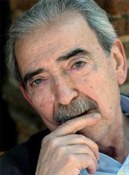Skip to: site menu | section menu | main content
Welcome To Democracy And Socialism .Com
Things should be made as simple as possible, but not any simpler- Albert Einstein
Juan Gelman (1930 - 2014) |
 |
Recently on January 14th, Juan Gelman died in Mexico City, Mexico. He was a prominent Argentine poet and one of the greatest authors in Spanish language. Gelman was a devoted journalist, activist for human rights and social justice for all.
By his personal painful experience, he became a fierce critic of Argentina’s “dirty war” against progressive forces under the rule of military dictatorship of 1976- 1983.
Gelman was born on May 3rd, in a predominantly Jewish neighbourhood of Buenos Aires, Argentina. He was the third son of Ukrainian immigrants. His father Jose was a revolutionary socialist who participated in the 1905 Russian Revolution. Disillusioned by the policies of Stalin, Jose Gelman left Russia with his wife and his two sons in 1928.
Juan learned to read when he was only 3 years old. He became interested in poetry while his older brother Boris read him Russian poems; a language that Juan did not know.
Juan wrote his first poem at the age of 8. At the age of 11 his love poems were published in the Red and Black magazine.
Growing in a socialist family, while witnessing the tough living conditions of the poor and the working class families in the Villa Crespo neighbourhood encouraged him to join the Federation of Young Communists.
In 1948 Juan began studying Chemistry at Buenos Aires University, but soon abandoned it to concentrate on poetry.
In 1955 Juan became one of the founders of a poetry group, The Hard Bread, made up mostly of young communists. They offered a committed and popular poetry and adopted a cooperative operation for the publication and distribution of their works.
In 1959, Gelman married Russian Berta Schubaroff, they had a son, Marcelo, and a daughter, Nora Eva, and they divorced in 1969.
In 1963, during the short presidency of Jose Maria Guido, Juan and his comrades in the group were imprisoned for their membership of the Communist Party of Argentina.
After his release, Juan left the Communist Party opposing its bureaucratic structure and dogmatic leadership, but never abandoned his passionate struggle for social justice, peace and democracy.
After leaving the Communist Party, Juan and other young writers founded the New Expression Group and publishing house, The Armored Rose and distributed leftist books rejected by the orthodox communists.
During the military dictatorship of 1966-73, which called itself, the Argentina Revolution, Gelman joined the underground Revolutionary Armed Forces (FAR), a Peronist-Guevara militant group. In the late 1973 FAR merged with Montoneros, a leftist Peronist guerrilla organization.
While Gelman worked as a journalist, he played an important role in both the cultural and communication efforts of FAR and Montoneros.
In 1969, Gelman became the editor of the Panorama magazine; from 1971-73 he was in charge of cultural branch of La Opinion newspaper; from 1973-74 the secretary of Crisis magazine; and in 1974 he became the editor of Noticias newspaper.
On March 24 1976, a CIA sponsored military coup took place in Argentina. Like the Chilean bloody coup of 1973, it set up a system of state terrorism causing the disappearance of nearly thirty thousand people: the Dirty War.
Gelman barely avoided arrest and was forced into exile in Italy, Spain, France, New York, Nicaragua and the last 20 years of his life in Mexico City. During this period, he also worked as a translator for UNESCO.
At the start of the Dirty War, Juan Gelman’s 20 year old son, Marcelo and his 19 year old and seven months pregnant daughter-in-law Maria Claudia were kidnapped by right-wing armed men from their home in Buenos Aires. They disappeared without a trace.
Since then Gelman’s tireless search for information about his family member’s fate and others who “disappeared” under the Junta, made him an icon in the fight for human rights. He, similar to the Mothers of the Plaza de Mayo, became a well-known symbol for struggle against the bloody dictatorship of military Junta.
In 1989, Gelman was led to identify his son’s remain. Marcelo had been executed and buried in a barrel filled with sand and cement. The remains of Maria Claudia have not yet been recovered. In 2000, Gelman was able to trace his granddaughter, Maria Macarena. She was born in a backdoor hospital before her mother’s murder and given to a pro-government police family in Uruguay.
In 1979, Gelman rejected the violent policies of the Montoneros and renounced his membership in that organization; but still even after the fall of the military dictatorship in 1983, he remained a wanted man in Argentina. This undemocratic conduct of Raul Alfonsin’s government provoked protests among many Latin American writers and intellectuals.
In 1988, Gelman married the Argentinian psychologist and poet, Mara la Madrid. Together they continued their effort to know the fate of the disappeared friends and families.
Gelman received many literary awards among them; The Argentine National Poetry Prize in 1997; Pablo Neruda Prize in 2005; and the most prestigious prize for Spanish writers, the Cervantes Prize in 2007.
In the past decade, he wrote articles for the leftist Argentinian daily newspaper Pagina 12. In his comments, he denounced imperialist wars especially in Iraq and Afghanistan, and sharply opposed the Israeli government’s treatment of Palestinians.
Gelman remained a committed champion for social justice, peace and democracy until his death.
Gelman published more than twenty books during his lifetime. His works have been translated into 14 different languages.
Some of his translated works in English are:
Unthinkable Tenderness: Selected Poems, 1997
The Poems of Sidney West, 2009
Between Words: Juan Gelman Public Letter, 2010
Commentaries and Citations, 2011
Dark Times Filled With Light, the Selected Works of Juan Gelman, 2012
Com/positions, 2013